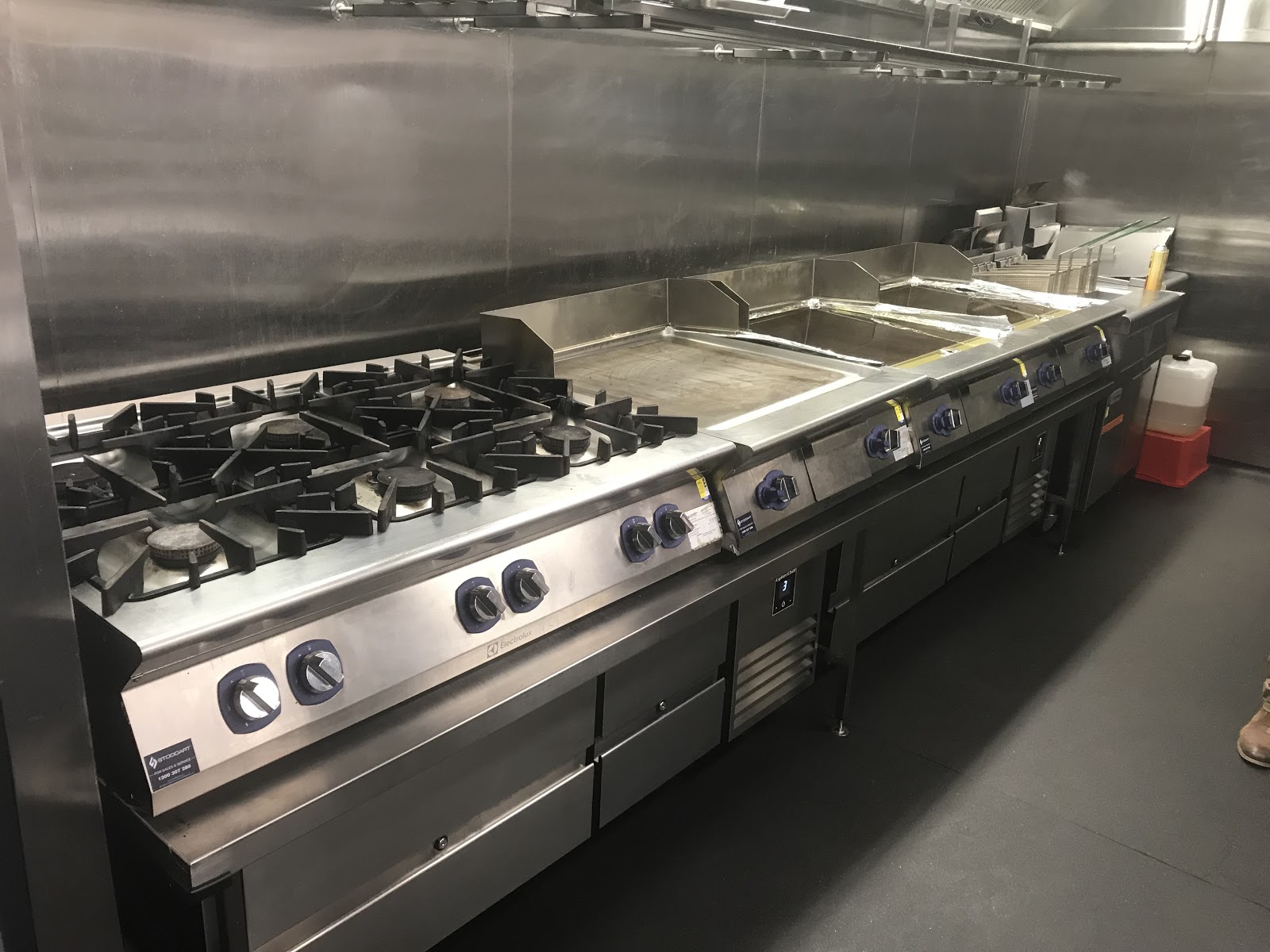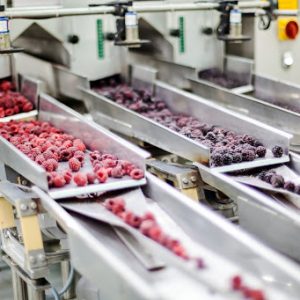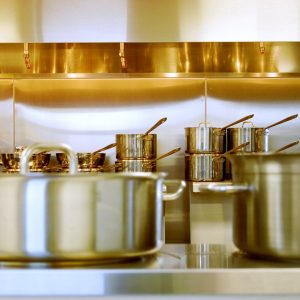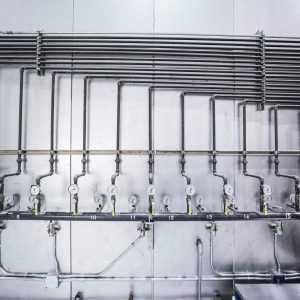Are There Alternative Metal Solutions to Stainless Steel?


When it comes to the food production industry, depending on what type of food you’re making and the ingredients used, you will always need materials that are durable and can handle the environment. However, some materials are better than others.
Stainless steel is the most commonly used steel in the food production industry for many reasons. But, how many of you actually know what stainless steel is made out of and the purpose it provides in the food production industry?
Here at Donewright Stainless, we are proud to offer stainless steel fabrication services for the food production industry.
In this article, we will discuss what stainless steel is, its benefits, and the other metal alternatives that can be used in the food production industry.

First of All – What Is Stainless Steel?
Stainless steel is a type of durable steel that’s made from the two ingredients of chromium and nickel. For the steel to be recognised as stainless, it needs to have 10.5% of chromium.
Also, for stainless steel to be considered ‘food grade’ or to be used in the food production industry, it should be fabricated from 300 and 400 steel. The 400 steel contains chromium, nickel and smaller amounts of other metals to make up the rest.
The most commonly used stainless steel grade in the food production industry is grade 304 (also known as 18-8) because it has 18% chromium and 8% nickel. Stainless steel is primarily used in the food production industry because of its corrosion resistance and other benefits, such as:
- Strength – Stainless steel’s strength retains at both very high and very low temperatures.
- Clean – Stainless steel is one of the most hygienic materials as bacteria, and other pathogens cannot grow on it because it is so easy to clean.
- Corrosion Resistance – Stainless steel is commonly used in the food production industry because it is resistant to corrosion and rusting.
- Durable – Even under heavyweight, stainless steel won’t buckle, making it one of the most durable metals out there.
Although stainless steel fabrication is most frequently used in the food production industry, there is the question of if there are any alternative metal solutions to stainless steel and what their benefits are.
Below, we will outline if there are any alternatives and what they are.
Food Safety Regulations (AUS ANZ)
Since stainless steel fabrication is one of the main components used in the food production industry, there are specific regulations that must be followed, such as:
Walls and ceilings should protect food from contamination and thus they should be enclosed to ensure no dust, dirt, or pests get inside. The Food Standards Guidebook states “wall surfaces in kitchens and other food processing areas must be finished with impervious materials, such as ceramic tiling, vinyl sheeting or stainless steel”. Stainless steel is ideal as it doesn’t absorb grease, food and water, making it easy to clean and hygienic in the long run.

Stainless Steel Applications In The Food Industry
There are many reasons why stainless steel is such a common material that is used in the food production industry and because of its large range of benefits. Stainless steel works well in high heat environments like kitchens and can withstand certain chemicals that other steels can’t handle. Stainless steel is a strong metal that doesn’t corrode easily, meaning it is durable and able to be kept properly sanitised and hygienic, which is a must in the food industry. It is also an affordable material considering its durability, making it a cost-effective way to follow health and regulations in the food industry.
Alternative Options
Although stainless steel is the most commonly used steel in the food production industry, there are a few more affordable alternatives that can be used, such as:
MILD STEEL/LOW CARBON STEEL
If you own a food production business where there is a lot of water contact, using carbon steel instead of stainless steel isn’t the right choice because it isn’t as water-resistant.
If you are thinking about using mild steel or low carbon steel for your business, one of the main positives about carbon steel compared to stainless steel is that it is a lot more affordable.

ALUMINIUM
Aluminium is an excellent alternative to stainless steel because it is more malleable, meaning that it can be used for more complex shapes as its elasticity ensures more flexibility.
While aluminium doesn’t rust; it is more likely to corrode easier however it is lighter in weight compared to stainless steel.
COATINGS/FINISHES
If you can’t afford food production industry-suitable metals, then coatings are an easy way to navigate this.
Below are some of the best coatings/finishes you can use in the food production industry:
1. Electropolishing – This polish is great but not for large scale projects. It is used more for frying baskets and other smaller kitchen items.
2. Antimicrobial Coatings – These help the resistance to corrosion, help harden the material, and make it more tolerant to heat. They are great for extending the life of metals and can also be put on stainless steel.
3. Polymer and Fluoropolymer – They are excellent coatings that can be used in harsh environments such as acids, and they are non-toxic.
4. Galvanised Sheet – This coating increases the longevity of the metal as well as its corrosion resistance.
5. Hot-dip Galvanising – Hot-dip galvanising improves the quality of the metal as it increases its resistance to environmental impacts and has a high maximum operating temperature of 665ºС
6. Colorbond Coating – This type of coating increases the lifespan of the metal and can handle hot temperatures.
7. Painted & Powder Coat – Both paint and powder coats increase the durability of any metal it comes into contact with. However, painted coats are still susceptible to chipping, so it would be better to go with powder coating.
If you are looking for quality steel fabrication services in Brisbane for your food or dairy production company, look no further than Donewright Stainless.
As leading steel fabrication specialists in Queensland, we provide metalwork and welding solutions to a range of clients across a variety of industries, including automotive, fire services and packaging. Committed to the highest standards of service and quality, you can rest assured your next project is in the best of hands.
From stainless and mild steel to aluminium fabrication, our efficient team provides reliable, tailormade solutions that stand the test of time. Whether you’re in need of pipework or handrails, Donewright Stainless has you covered. Need a specific grade or design of stainless steel applications for your production line? We can handle it for you.
Get things done ‘wright’: An Australian made and owned company, our qualified tradespeople perform any job professionally and with expertise. We’re happy to help, no matter the size or complexity of your project. If you’re after quality metal fabrication, contact the team today.

